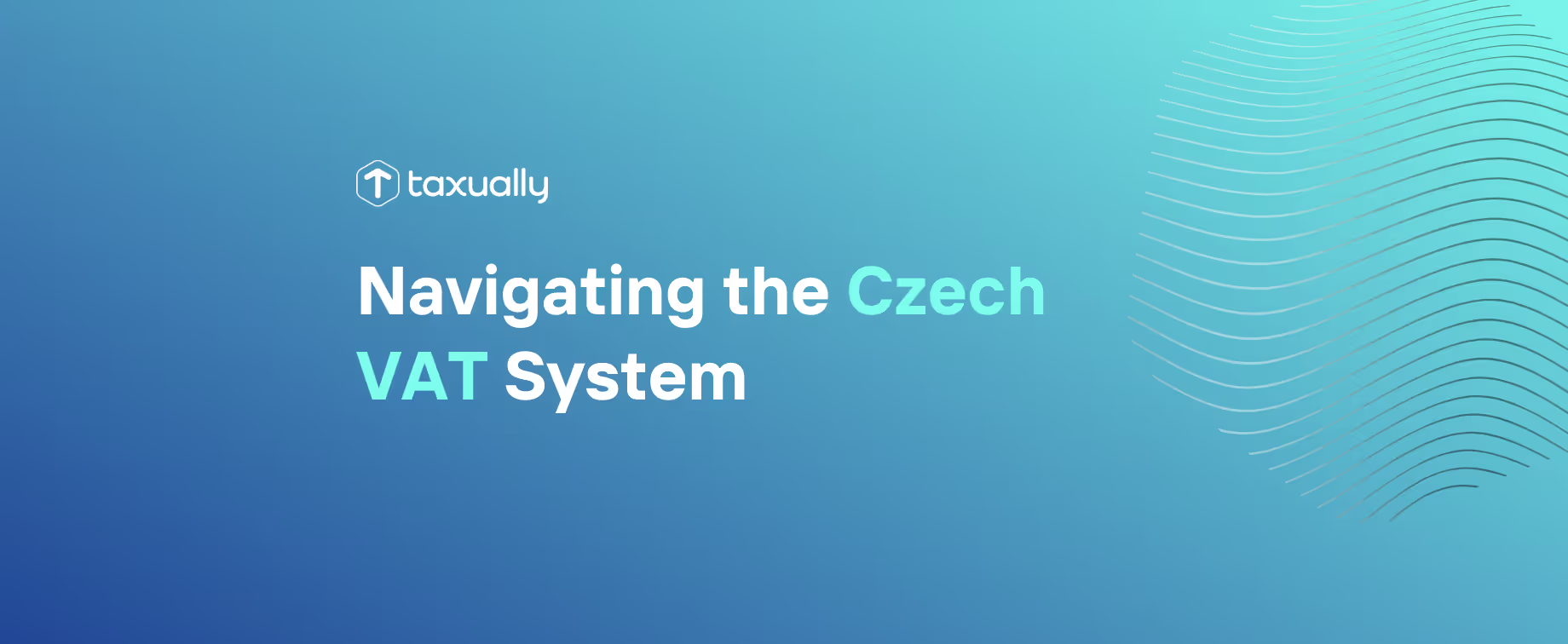Key takeaways
- Czech VAT is governed by the Value Added Tax Act and requires businesses to register for it when they meet specific criteria.
- Different goods are eligible for reduced rates or exemptions, while electronic invoicing and record keeping must be maintained to avoid penalties.
- Companies may also reclaim incurred VAT on purchases with the necessary documentation provided.
Value Added Tax (VAT) plays a vital role in the revenue generation and economic stability of many countries in the EU and around the world, including the Czech Republic. VAT systems can, however, be difficult for businesses to navigate, particularly in a country where you don't understand the language, or the laws. In this post, we'll take a comprehensive look at VAT in the Czech Republic, shedding light on its rates, registration thresholds, exemptions, and more.
Understanding Czech VAT: an overview
The Czech Republic joined the EU VAT regime in 2004, which is an essential part of Czech VAT compliance. The VAT Act, the primary legislation governing Czech VAT since 1994, includes provisions for reduced VAT rates. The Czech government, through its Ministry and the Finance Tax Authorities, oversees the regulation of the VAT Act, including the process of VAT refund.
The VAT regulations in the Czech Republic are determined by Act 235/2004 Coll., in addition to the directives on intra-community VAT issued by the European Union. VAT registration for businesses is required in the Czech Republic under certain circumstances. For companies distance selling goods and services to customers in the Czech Republic, VAT registration is mandatory once the distance selling threshold of €10,000 is reached.
To ensure compliance with Czech VAT regulations, non-EU companies must appoint a fiscal representative.
Czech VAT rates explained

In the Czech Republic, VAT rates play a significant role in shaping the economic landscape. There are three main VAT rates: a standard rate of 21%, a reduced rate of 15%, and a super-reduced rate of 10%.
Standard rate: 21%
The standard VAT rate in the Czech Republic is 21%. This rate applies to most goods and services that are not eligible for reduced rates. Common items subject to the standard rate include electronics, clothing, furniture, and many everyday consumer products. Businesses collecting VAT at the standard rate must ensure compliance with tax regulations and accurately calculate the amount due.
Reduced rates: 15% and 10%
Beyond the standard rate, the Czech Republic also employs reduced VAT rates of 15% and 10%. These reduced rates are typically applied to specific categories of goods and services in order to promote affordability and economic growth.
The reduced rate of 15% is usually applied to essential items such as certain food products, books, pharmaceuticals, medical equipment, and water supplies. This rate acknowledges the importance of these goods to everyday life and seeks to ease the burden on consumers.
Meanwhile, the super-reduced rate of 10% is primarily associated with necessities that have an even more profound impact on individuals. These include various agricultural products, certain medical aids, newspapers, and cultural events. The lower rate aims to make these necessities more accessible to a broader segment of the population.
Zero rate: 0%
The Czech Republic, like many other countries, also employs a zero-rated VAT category. Unlike exempt items (which are not subject to VAT at all), goods and services subject to a zero rate still qualify for VAT purposes but at a 0% rate. This often applies to international transport services, exports, and some other specialized cases.
Exempt items
Certain goods and services fall under the VAT exempt category and are not subject to VAT in any way. These might include education, healthcare, certain financial services, and residential property rentals. While this may seem advantageous to consumers, it also means that businesses providing these exempt services cannot recover VAT on their costs.
Registering for a Czech VAT number
To obtain a Czech VAT number, businesses must provide a certificate of incorporation, proof of address, and ID of the legal representative. Keep in mind that all documentation must be translated into the Czech language by a sworn translator. Czech VAT numbers have the format CZ99999999 / CZ999999999 / CZ9999999999.
Registering for VAT is a straightforward procedure compared to establishing a company. Generally, the VAT number can be obtained from the relevant Czech tax office within a month. It’s essential to register for VAT to avoid penalties, as failing to register for VAT in the Czech Republic may result in a maximum penalty of CZK 500,000.
The Czech Tax Authority and the Ministry of Finance are the authorities responsible for implementing VAT in the Czech Republic. Both of these organizations provide oversight of the rules and regulations to ensure compliance. It's crucial for businesses to stay compliant with VAT regulations to avoid potential complications and penalties.
Intra-community supplies and VAT
In the EU, intra-community supplies play a significant role in the VAT system, governing the movement of goods and services between member states. Intra-community supplies refer to transactions where goods or services are transferred from one member state to another, involving at least two VAT-registered businesses. These transactions are treated as 'taxable events' for VAT purposes and are subject to specific regulations to ensure consistency and fairness within the EU's single market.
For VAT purposes, intra-community supplies of goods are considered zero-rated, meaning that while the transaction is still subject to VAT, the VAT rate applied is 0%. This prevents double taxation of goods that are intended for trade within the EU's internal market. However, the supplier must adhere to stringent record-keeping requirements to demonstrate the authenticity of the transaction, such as obtaining and verifying the customer's VAT identification number.
VAT reporting and deadlines
The taxable periods for VAT reporting in the Czech Republic are either monthly or quarterly. Companies in the Czech Republic with a VAT number must comply with certain requirements. They must complete and submit VAT returns stating all taxable income (sales) and expenses (costs).
Taxable periods
In the Czech Republic, the taxable period for VAT reporting is either monthly or quarterly, depending on the company’s annual turnover and other factors.
VAT returns and payments are due on the 25th day of the month following the tax return period.
Penalties for late filing
Failing to adhere to the timeframes established by the Czech authorities for the payment and submission of VAT may result in penalties. The penalties for late filing of VAT in the Czech Republic include fines of up to 20% of the VAT due, with a maximum penalty of CZK300,000. Late filings may also incur interest charges on unpaid VAT.
VAT recovery in the Czech Republic
To recover VAT in the Czech Republic, businesses must provide the necessary documentation. In general, a non-resident company in the Czech Republic can reclaim all or part of the VAT incurred on its expenditures. VAT incurred on purchases, imports, or intra-community acquisitions of goods and services for taxable activities can be reclaimed.
It's important that businesses be aware of the requirements for recovering VAT in the Czech Republic and that they provide the necessary documentation to ensure they can reclaim the VAT on their expenses.
Invoicing and record-keeping
A VAT invoice is not just a simple piece of paperwork; it's a crucial document that ensures compliance with tax regulations and facilitates smooth financial transactions between businesses. Czech VAT invoices are required to include the following:
Basic Information: Your VAT invoice must contain the following basic details:
- Your company's name, address, and VAT number.
- The customer's name, address, and VAT number, if applicable.
- A unique invoice number and date of issue.
Invoice date and due date: The invoice should clearly state the date it was issued and the due date for payment.
Description of goods and services: Each item on the invoice must be described in detail. Include the quantity, unit price, and any applicable discounts.
Total amount: Clearly state the total amount due, including the VAT. Break down the calculation to show the net amount and the corresponding VAT rate applied.
VAT rates: The Czech Republic has different VAT rates for various goods and services. Your invoice must indicate the appropriate VAT rate for each item, along with the calculated VAT amount.
Currency: Specify the currency in which the transaction is being conducted. If different currencies are used, provide clear conversion rates.
Electronic invoicing: The Czech Republic encourages electronic invoicing. Ensure that your electronic invoices are in compliance with the regulations set by the Ministry of Finance.
Sequential invoice numbering: Your invoice numbers should follow a sequential pattern. This aids in easy tracking and auditing.
Reverse charge: In some cases, the VAT liability might be shifted to the recipient of the goods or services. Clearly indicate when the reverse charge mechanism applies.
Language: Invoices must be in Czech or another language agreed upon by both parties. Ensure that all information is accurately translated.
Retention period: Maintain a copy of all issued invoices for a period of at least 10 years. This is necessary for potential tax audits.
Reverse charge mechanism

The reverse charge mechanism in the Czech Republic is a VAT regulation that shifts the responsibility for VAT payment from the supplier to the recipient of goods or services.
In the context of the Czech Republic, the reverse charge mechanism is applied to specific categories of goods and services as defined by the government. When the reverse charge mechanism applies, the recipient of the goods or services is required to report both the input and output VAT on their VAT return. This means that the recipient declares the VAT on their own VAT return but simultaneously deducts it as input VAT, resulting in a neutral effect on their overall tax liability. This approach simplifies the VAT process for businesses by eliminating the need for the supplier to collect and remit VAT.
Intrastat declarations
Companies may have to submit Intrastat & EC Sales List returns to the Czech authorities, in addition to filing VAT returns. Such returns are a legal obligation for companies that meet certain criteria. The Intrastat statement must be submitted by the 12th of the month following the reporting period. Intrastat declarations in the Czech Republic must be submitted on a monthly basis. Also, declarations must be submitted electronically and in accordance with the requirements set by the Czech customs office.
Fines and other sanctions may be imposed for late filing of Intrastat declarations in the Czech Republic. It's crucial for businesses to stay compliant with Intrastat reporting requirements to avoid potential complications and penalties.
Conclusion
Navigating the Czech VAT landscape might seem daunting at first, but now that you've read our guide you should be better equipped to tackle the country's VAT regulations, reporting, and compliance requirements.
Do you need help with your VAT compliance? Book a free call with one of our VAT experts to find bespoke solutions for your business, optimize your VAT costs, and reach millions of new potential customers.
Frequently asked questions
New Year's Day - 1/1/2024Memorial Day - 5/27/20244th of July - 7/4/2024Labor Day - 9/2/2024Thanksgiving Day - 11/28/2024Day after Thanksgiving - 11/29/2024Christmas Eve - 12/24/2024Christmas Day - 12/25/2024
What is the VAT in the Czech Republic?
The VAT rate in the Czech Republic is 21%.
It also features two reduced VAT rates of 15% and 10%.
Is the Czech Republic in the EU for VAT purposes?
The Czech Republic has been an EU member since 2004 and is part of the EU single market, which means the country is subject to EU VAT rules.
How do I register for a Czech VAT number?
To register for a Czech VAT number, you must provide a certificate of incorporation, proof of address, and ID of the legal representative, translated into the Czech language by a sworn translator.
This translation must be done by a translator certified by the Czech Ministry of Justice. The documents must be submitted to the Czech Tax Office in order to obtain the VAT number.



















